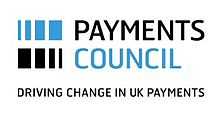Payments Council

The Payments Council is an organisation of financial institutions in the United Kingdom that sets strategy for UK payment mechanisms.[1]
History
In his 2003 Pre-Budget Report, then-Chancellor Gordon Brown announced that the Office of Fair Trading (OFT) would lead a new Payments Systems Task Force. The OFT recommended to the Chancellor in 2006 that the Task Force should establish a new body responsible for the integrity and efficiency of co-operative payment systems in the UK. This was set up as the Payments Council in 2007.[2][3]
By the time of a planned two-year OFT review in 2009, the Payments Council had taken over some activities from the Association for Payment Clearing Services (APACS), which no longer exists. One of the tasks of the Payments Council has been to implement a phased roll-out the Faster Payments Service, taking clearing times in the UK from among the slowest to among the fastest in the world. Critiques have been made about delays and shortcomings in delivery and for inability to ensure Faster Payments members promptly pass on benefits to their customers.[2]
Structure
Board
The board of the Payments Council consists of:
- Independent non-voting chairman
- 15 voting directors
- An observer from the Bank of England
Of the 15 directors on the Board, 11 are industry-appointed directors who represent a cross section of Payments Council membership, and 4 independent directors. Each independent director holds one voting seat and is appointed for a period of three years, which can be extended once for a further three years. The independent directors together have the power of veto and produce an annual report each year.[4]
Membership
The Payments Council is a voluntary membership organisation, with a mix of full and associate members.[5]
Contracts
On behalf of the UK payments industry as a whole, the Payments Council operates contracts with service providers such as BACS, CHAPS, Faster Payments, Cheque and Credit Clearing Company Limited and the LINK ATM Scheme.[2]
National Payments Plan
The National Payments Plan is the document in which the Payments Council sets out its strategic vision for the future development of payment services in the UK.
The first national payments plan was published in May 2008 and updates are published on an annual basis.[6]
Closure of cheque clearing
The first major move of the Payments Council, in 2009, was to agree to a target of 2018 for the closure of cheque clearing in the UK.[7][8] It also announced that the cheque guarantee card scheme would end in June 2011.
The Payments Council advised a Treasury Select Committee inquiry in February 2010 that cheques were in "terminal decline", down to 3.5 million per day in 2009 from a peak of 11 million in 1990.[7] After lobbying from the charity sector, the Council reaffirmed in October 2010 that the 2018 closure is conditional on adequate alternatives being in place by 2016.[9]
However, in April 2011 the Select Committee reopened its inquiry into the 2018 target date, after receiving a large volume of correspondence from small businesses, voluntary organisations and older people who were still using cheques.[10] The inquiry will also consider the structure and performance of the Payments Council, including whether it is sufficiently accountable for the impact of its decisions on consumers.[7][11]
The chairman of the inquiry, Andrew Tyrie MP, stated, "The Payments Council has not thought through its arguments carefully enough and its first piece of work on the cost–benefit of abolishing cheques was clearly defective."[7] The Payments Council welcomed the opportunity to reassure the public that cheques would not be abolished before acceptable alternatives were available.[12]
On 12 July 2011 the Payments Council announced it had cancelled the 2018 target date to close cheque clearing and that cheques will remain as long as customers need them.[13]
Sort Code Validation Accreditation Scheme
The Sort Code Validation Accreditation Scheme is a scheme sponsored by the Payments Council,[14] aimed at improving the distribution of bank reference data and the quality and accuracy of reference data used within the UK payments industry.[15]
The Sort Code Validation Accreditation Scheme (SCVAS) was launched in 2010. It is aimed at commercial providers offering sort code validation products and services which are used by organisations to manage their electronic payment processing.
Accreditation under the scheme requires products to satisfy certain 'Threshold Criteria' set by the UK Payments Council. In particular these criteria stipulate the minimum frequency with which bank reference data must be updated.[16]
See also
References
- ↑ Payments Council outline at UK Payments Administration
- ↑ 2.0 2.1 2.2 Review of the operations of the Payments Council (OFT1071), OFT, March 2009
- ↑ ‘Payments Council’: The new name setting payments strategy in the UK, Payments Council press release, 2007
- ↑ Payments Council Board
- ↑ Our members, Payments Council. Retrieved 18 January 2013.
- ↑ National Payments Plan
- ↑ 7.0 7.1 7.2 7.3 King, Mark. Abolition of cheques to be reconsidered, The Guardian, 14 April 2011
- ↑ 2018 target date set for closure of central cheque clearing, Payments Council press release, 16 December 2009
- ↑ Mair, Vibeka. Abolition of cheques in 2018 not definite, says Payments Council, Civil Society, 29 October 2010
- ↑ Moore, Elaine; Ross, Alice. Inquiry reopened into ban on cheques. Financial Times, 14 April 2011. Retrieved 19 April 2011. Archived 19 April 2011 at WebCite
- ↑ The future of cheques, Commons Select Committee, 14 April 2011
- ↑ Cheque abolition to be examined by MPs, BBC News, 14 April 2011
- ↑ Payments Council to keep cheques and cancels 2018 target, Payments Council 12 July 2011
- ↑ Sort Code Validation Accreditation Scheme
- ↑ UK Payments Council, Sort Code Validation Accreditation Scheme
- ↑ UK Payments Council, table of accredited products
External links
- Payments Council
- Pay Your Way, the Payments Council's consumer campaign]